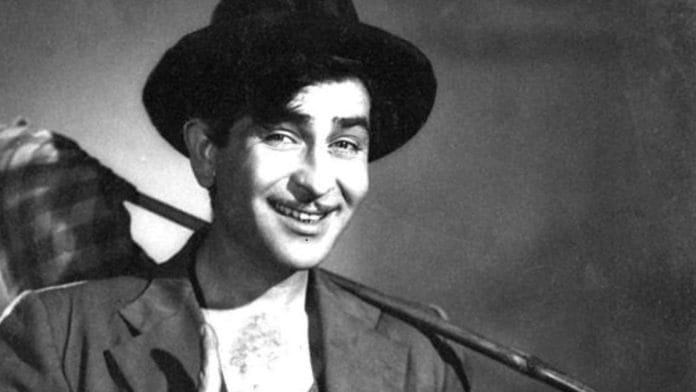New Delhi: Bollywood is gearing up to celebrate the 100th birth anniversary of its greatest showman, Raj Kapoor. From Aag and Barsaat to Shree 420, RK films will screen Kapoor’s top 10 hits across 40 cities and 135 cinema halls from 13-15 December. Organised in collaboration with the Film Heritage Foundation, NFDC-National Film Archive, and multiplex chains PVR-INOX and Cinepolis, the ‘Raj Kapoor 100’ festival will be inaugurated by his family on 13 December in Mumbai.
Among the power-packed lineup is the 1964 romantic drama Sangam, the first film Raj Kapoor shot entirely in colour. Starring Kapoor, Vyjayanthimala and Rajendra Kumar, it was also the first Indian movie to be shot exclusively abroad, which made it a massive commercial success. Some of its songs, such as the iconic Main Kya Karoon Ram, became etched in the annals of pop culture history.
“These were films that not only captured the imagination of the people but reflected prevalent social and political themes beginning from a newly independent India,” said Shiverndra Singh Dungarpur, filmmaker and director of the Film Heritage Foundation.
Raj Kapoor, born Shrishti Nath Kapoor, first appeared on screen as a child actor in Inquilab (1935). The son of actor Prithviraj Kapoor and his wife Ramsarni Kapoor, he also assisted film director Kidar Sharma at Bombay Talkies and worked as an art director at his father’s company Prithvi Theatre. His acting career took off with Neel Kamal (1947). The very next year, he started his own film production company, RK Films, where Nargis was also an investor.
Kapoor and Nargis’ pairing was an on-screen favourite and they did 16 films together.
India’s greatest showman
Founded by Shivendra Singh Dungarpur in 2014, the Film Heritage Foundation is a not-for-profit organisation that is dedicated to “supporting the conservation, preservation and restoration of cinema”. The foundation has organised several film festivals featuring legendary actors such as Dilip Kumar, Dev Anand, Akkineni Nageswara Rao and Amitabh Bachchan. They also hold film preservation workshops to educate people about film conservation. The organisation’s last event was held in September last year in Delhi.
“Raj Kapoor was an artist who lived for cinema. Even today Awaara is a film that is etched in my mind. Made at a time of newly independent India, the film was socialistic, reflecting the mood of the times,” said Amitabh Bachchan according to the Film Heritage Foundation website.
Raj Kapoor received the Padma Bhushan in 1971, the Dadasaheb Phalke Award in 1988, and 11 Filmfare awards in different categories. His films also received international acclaim and were especially popular in Russia. According to the Film Heritage Foundation, Awaara (1951) and Boot Polish (1954) competed for the Grand Prize at the Cannes Film Festival in 1953 and 1955, respectively. And his 1956 film Jagte Raho won the Crystal Globe at the Karlovy Vary International Film Festival in 1957.
“If you see Awaara, it was based on casteism. Shree 420 spoke about greed and the underprivileged. In his latter films, he made strong films with Indian moral values,” said his grandson Ranbir Kapoor at the International Film Festival of India in November. The actor also revealed one of his fondest memories of his grandfather. “He used to take us to his room, and he used to hide these caramel toffees in his fridge. He used to make us stand in a line, all the cousins, Kareena, Karishma, my sister, myself, and ask us to do Salaam and to sing ‘Awaara Hoon’ from Awaara.”
Raj Kapoor’s last film as a director was Ram Teri Ganga Maili (1985). The actor died on 2 June 1988.
(Edited by Zoya Bhatti)






